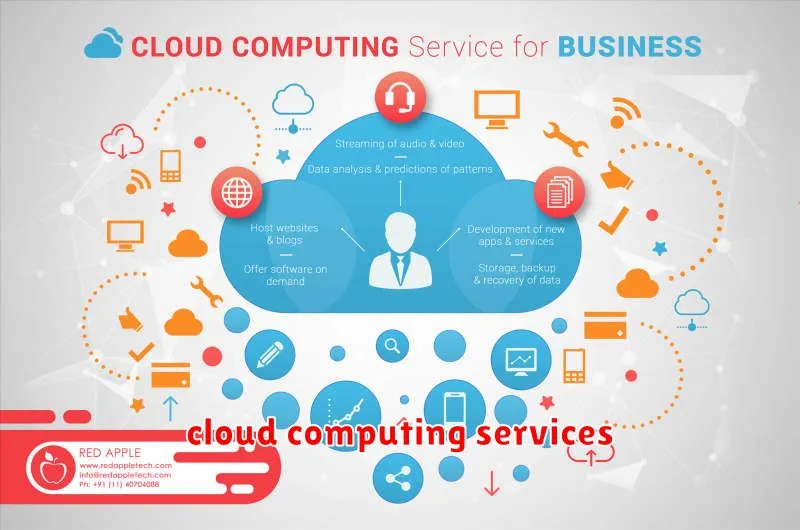In today’s digital landscape, cloud computing has become an indispensable tool for businesses of all sizes. From startups to enterprises, organizations are increasingly turning to the cloud to enhance efficiency, scalability, and cost-effectiveness. However, with numerous cloud service providers and a plethora of options available, navigating the cloud landscape can be a daunting task. This article aims to provide a comprehensive comparison of the leading cloud computing services, empowering you to make informed decisions for your business needs.
We will delve into the various cloud service models, including Infrastructure as a Service (IaaS), Platform as a Service (PaaS), and Software as a Service (SaaS), exploring their unique features, benefits, and use cases. Additionally, we will analyze the key players in the cloud computing market, such as Amazon Web Services (AWS), Microsoft Azure, and Google Cloud Platform (GCP), comparing their offerings, pricing structures, and industry-specific solutions. By understanding the nuances of each service provider and model, you can choose the optimal cloud solution that aligns with your specific requirements and unlocks the true potential of cloud technology for your organization.
Introduction to Cloud Computing Services
In the digital age, businesses of all sizes are leveraging the power of cloud computing to enhance their operations and achieve greater efficiency. But what exactly is cloud computing? In essence, it’s a model that allows you to access computing resources—such as servers, storage, databases, networking, software, analytics, and intelligence—over the internet, on demand. This means you don’t need to purchase and maintain expensive hardware, software, and infrastructure in-house.
Think of cloud computing as a vast network of data centers that house servers and other IT resources. These resources are available to users through various service models, which are the core of the cloud computing paradigm.
There are three main service models in cloud computing:
- Infrastructure as a Service (IaaS): This model offers fundamental building blocks, including virtualized servers, storage, and networking. Think of it as renting the raw materials for your IT infrastructure.
- Platform as a Service (PaaS): PaaS provides a platform for developing and deploying applications, often including tools for development, runtime, and management. It simplifies application development and deployment by providing a ready-to-use environment.
- Software as a Service (SaaS): This model delivers software applications over the internet. Users access these applications through a web browser or mobile app, without needing to install them locally. Popular examples include email services, productivity suites, and customer relationship management (CRM) systems.
With these service models, cloud computing empowers businesses to access and scale resources as needed, pay only for what they use, and enjoy the flexibility and agility to adapt to evolving demands. In the coming sections, we will delve deeper into these service models and explore their specific functionalities and benefits.
Types of Cloud Computing Services
Cloud computing is a powerful tool that offers businesses and individuals alike a flexible and cost-effective way to access and use computing resources. But with different types of cloud services available, it can be challenging to navigate the landscape and choose the right option for your needs.
To understand the different types of cloud computing services, it’s helpful to think about the level of control you have over the underlying infrastructure and the specific resources you access. There are three main categories: Infrastructure as a Service (IaaS), Platform as a Service (PaaS), and Software as a Service (SaaS).
Infrastructure as a Service (IaaS)
IaaS provides the most granular level of control, offering access to fundamental computing resources such as servers, storage, and networking. You’re essentially renting the raw building blocks of a data center, giving you complete freedom to configure and manage the software and applications you need.
Think of it like renting a bare-bones apartment. You get the space, but you’re responsible for furnishing and decorating it yourself. Examples of IaaS providers include Amazon Web Services (AWS), Microsoft Azure, and Google Cloud Platform (GCP).
Platform as a Service (PaaS)
PaaS simplifies development and deployment by providing a ready-made platform with tools and services for building and running applications. This eliminates the need to manage the underlying infrastructure, allowing you to focus on building your application.
Imagine renting a furnished apartment. You have everything you need to start living, but you’re not responsible for handling the maintenance or utilities.
Some popular PaaS offerings include Heroku, Google App Engine, and Microsoft Azure App Service.
Software as a Service (SaaS)
SaaS delivers fully functional software applications over the internet, accessible through a web browser or mobile device. This eliminates the need to install and maintain software on your own devices, simplifying deployment and reducing management overhead.
Think of this as renting a fully furnished and equipped apartment. All you have to do is move in and start enjoying it. Examples of SaaS include popular applications like Salesforce, Dropbox, and Google Workspace.
Choosing the Right Cloud Service
The best type of cloud service for your needs depends on your specific requirements and technical expertise. If you need granular control over infrastructure and are comfortable managing server configurations, IaaS might be a good choice. If you’re focused on application development and deployment, PaaS could be the more efficient solution. And if you’re looking for a ready-to-use application without the hassle of installation and management, SaaS is the way to go.
By understanding the different types of cloud services, you can make informed decisions and leverage the power of cloud computing to achieve your business objectives.
Key Cloud Service Providers: AWS, Azure, and GCP
The cloud computing landscape is dominated by three major players: Amazon Web Services (AWS), Microsoft Azure, and Google Cloud Platform (GCP). These providers offer a wide array of services, including compute, storage, networking, databases, analytics, and more. Each platform has its strengths and weaknesses, making it crucial for businesses to choose the provider that best aligns with their needs.
Amazon Web Services (AWS)
As the pioneer in the cloud computing market, AWS boasts the largest market share and a comprehensive suite of services. Its key strengths include:
- Extensive service portfolio: AWS offers a vast array of services, catering to diverse business requirements.
- Global infrastructure: Its vast network of data centers ensures high availability and low latency.
- Strong developer community: A large and active community provides support and resources.
Microsoft Azure
Azure is a strong contender, leveraging Microsoft’s existing ecosystem and enterprise focus. Its key advantages include:
- Integration with Microsoft products: Seamless integration with Microsoft Office 365 and other products.
- Hybrid cloud capabilities: Strong hybrid cloud solutions for businesses transitioning to the cloud.
- Enterprise-grade security: Robust security features designed for enterprise workloads.
Google Cloud Platform (GCP)
GCP leverages Google’s expertise in data analytics, machine learning, and artificial intelligence. Its key strengths include:
- Data analytics and AI: Powerful tools for data analytics and machine learning.
- Cost-effective solutions: Competitive pricing and discounts for specific services.
- Innovation and cutting-edge technology: Known for its focus on innovation and cutting-edge technologies.
Factors to Consider When Comparing Cloud Services: Compute
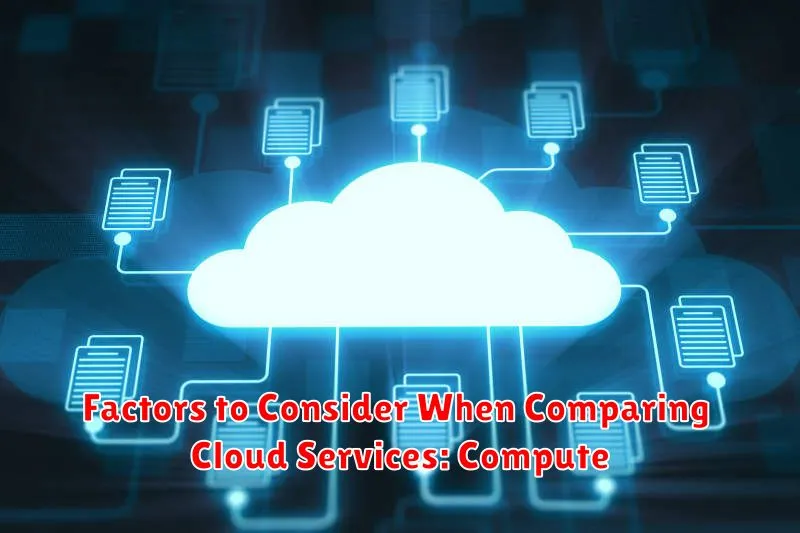
Navigating the vast landscape of cloud computing services can feel overwhelming. When choosing the right compute service, several factors demand careful consideration. This article explores key considerations to help you make informed decisions for your unique needs.
Compute Instance Types: The first crucial factor is understanding the different compute instance types offered by cloud providers. These instances are virtual machines designed for specific workloads. From general-purpose instances suitable for a variety of tasks to specialized instances optimized for high-performance computing, machine learning, or big data analytics, choosing the right instance type aligns directly with your application’s requirements.
Pricing Models: Cloud compute services employ diverse pricing models. You might encounter pay-as-you-go, reserved instances, or spot instances. Carefully analyze these models to determine the most cost-effective option for your usage patterns. Factors like the duration of your workload, predictability of resource needs, and budget constraints all play a role in selecting the appropriate pricing model.
Scalability and Elasticity: The ability to scale compute resources up or down dynamically is a core advantage of the cloud. Assess how easily you can adjust your compute capacity based on fluctuating demands. A flexible and scalable cloud service ensures your application’s performance remains optimal even during peak usage periods.
Networking and Connectivity: Robust network connectivity is paramount for reliable cloud performance. Examine the network infrastructure offered by the provider, including bandwidth, latency, and network security features. These aspects directly impact your application’s speed and responsiveness.
Management and Monitoring: Efficient management and monitoring tools are crucial for optimizing and troubleshooting your cloud infrastructure. Evaluate the management consoles, APIs, and monitoring dashboards provided by cloud providers. These tools enable you to track resource utilization, performance metrics, and identify potential issues proactively.
Security: Data security is a top priority in the cloud. Ensure your chosen cloud provider offers robust security measures, including encryption, access control, and compliance with industry standards. Regularly review the security certifications and policies of the provider to ensure your data remains protected.
By carefully evaluating these factors, you can make well-informed decisions when comparing cloud compute services. The ideal choice will align with your specific needs, ensuring optimal performance, cost-effectiveness, and security for your applications.
Factors to Consider When Comparing Cloud Services: Storage
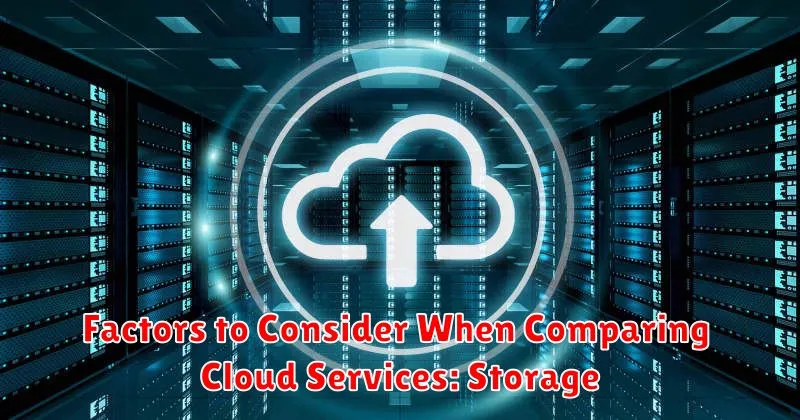
When choosing a cloud storage service, there are several key factors to consider. These factors will help you determine which service best meets your needs and budget.
Storage Capacity: The amount of storage space you need is crucial. Consider your current data size and projected future growth. Different providers offer varying storage tiers, from basic plans to enterprise-level solutions.
Data Redundancy and Security: Data security is paramount. Ensure the provider offers multiple data backups and encryption mechanisms to protect your information from loss or unauthorized access. Look for certifications like HIPAA and GDPR compliance, depending on your industry and data sensitivity.
Accessibility and Performance: Evaluate the provider’s global network infrastructure and data centers. Consider the latency and speed of accessing your data, especially if you work with large files or require real-time collaboration.
Pricing and Billing: Cloud storage services come with various pricing models. Some offer pay-as-you-go options, while others use tiered pricing based on storage capacity or usage. Compare the total cost of ownership and ensure the pricing aligns with your budget.
Scalability and Flexibility: Choose a service that can grow with your needs. Look for options to easily scale storage capacity up or down based on your data volume and workload changes.
By carefully considering these factors, you can select a cloud storage service that provides the performance, security, and cost-effectiveness you need for your data storage requirements.
Factors to Consider When Comparing Cloud Services: Networking
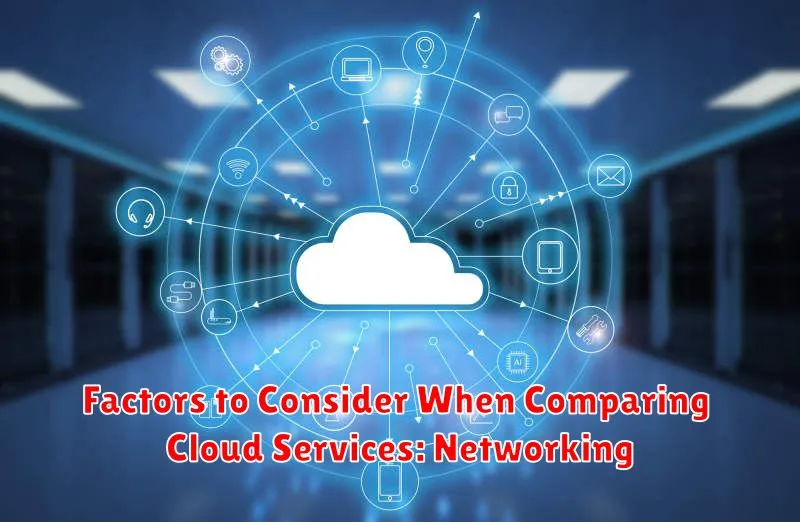
When comparing cloud services, it’s crucial to consider the networking aspects. These aspects directly impact the performance, security, and overall user experience of your applications. Here are some key factors to evaluate:
Network Performance: Consider the latency, bandwidth, and packet loss rates offered by different cloud providers. These factors significantly impact the responsiveness and reliability of your applications. Look for providers with a strong global network infrastructure and low latency in regions relevant to your users.
Network Security: Assess the security measures implemented by cloud providers. This includes firewalls, intrusion detection systems, and encryption protocols. Ensure they offer robust security features to protect your data and applications from cyber threats.
Network Connectivity: Consider the range of connectivity options provided by cloud providers, including public, private, and dedicated connections. Choose a provider that offers the right connectivity for your needs, whether it’s connecting your on-premises infrastructure to the cloud or accessing specific cloud services from different locations.
Network Management: Evaluate the level of control and visibility provided by cloud providers over your network resources. Look for platforms that offer comprehensive network monitoring, troubleshooting, and management tools. These features are essential for maintaining network performance and security.
Network Scalability: Consider the scalability of the cloud provider’s network infrastructure. Ensure they can accommodate your future growth and support increasing traffic demands without compromising performance.
By carefully considering these network factors, you can choose the cloud service that best meets your business needs and ensures a seamless and reliable cloud experience.
Factors to Consider When Comparing Cloud Services: Pricing
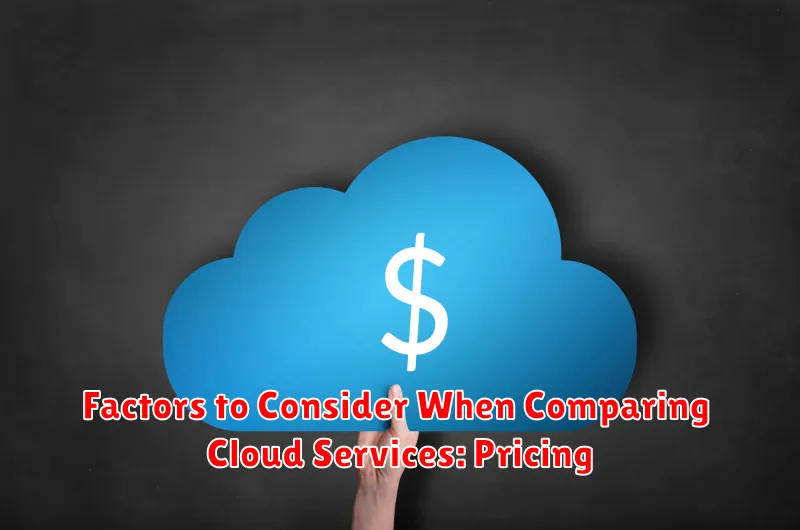
Choosing the right cloud service can be a daunting task, and it’s important to consider all the factors involved. While features and functionality are crucial, pricing is often a primary concern. Here’s a breakdown of essential pricing considerations when comparing cloud services:
Pricing Models: Cloud providers offer various pricing models, each with its own intricacies. Common models include:
- Pay-as-you-go: You pay only for the resources you use, making it ideal for fluctuating workloads.
- Subscription-based: You pay a fixed monthly or annual fee for a predetermined set of resources.
- Reserved Instances: You commit to using a certain amount of resources for a specified period, often leading to discounted rates.
Hidden Costs: Beyond the base price, be aware of potential hidden costs, such as:
- Data transfer fees: Charges for data moving in and out of the cloud.
- Storage fees: Different storage tiers come with varying costs.
- Support costs: Premium support plans may incur additional fees.
Scalability and Flexibility: Ensure the pricing model aligns with your expected growth and resource needs. A flexible model that allows you to scale up or down as required is essential for long-term cost optimization.
Transparency and Clarity: Choose providers that offer transparent and easily understandable pricing structures. Look for clear documentation outlining fees, usage limits, and potential cost variations.
Comparison Tools: Utilize online comparison tools or consult with cloud experts to gain insights into pricing details and make informed decisions.
Factors to Consider When Comparing Cloud Services: Security
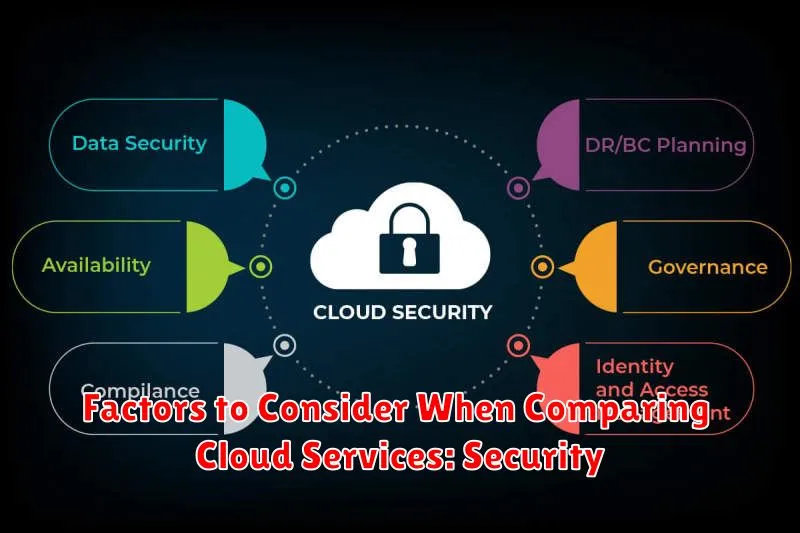
When choosing a cloud service provider, it’s crucial to consider the security measures they offer. Here are some key factors to evaluate:
Data Encryption
Look for providers that use strong encryption methods, both in transit (while data is being sent) and at rest (when data is stored). AES-256 is a widely accepted standard for encryption.
Access Control and Identity Management
Providers should offer robust access controls to ensure only authorized individuals can access your data. This includes features like multi-factor authentication (MFA), role-based access control (RBAC), and single sign-on (SSO) capabilities.
Compliance and Certifications
Check if the provider adheres to industry-standard security frameworks and certifications such as SOC 2, ISO 27001, HIPAA, and PCI DSS. These certifications demonstrate the provider’s commitment to security and data protection.
Security Audits and Monitoring
Find out if the provider conducts regular security audits and vulnerability scans. They should also have monitoring systems in place to detect and respond to security threats in real-time.
Data Recovery and Backup
Ensure the provider has robust data backup and recovery mechanisms in place to protect your data from outages or accidental deletion. They should offer regular backups and disaster recovery plans.
Data Residency and Sovereignty
If you have specific regulations regarding data storage location, consider the provider’s data residency options. Some providers offer services in specific regions to comply with data sovereignty laws.
Security Incident Response
Inquire about the provider’s security incident response plan. They should have a clear process for handling breaches and notifying customers in a timely manner.
By carefully evaluating these security factors, you can choose a cloud service provider that meets your organization’s security needs and protects your sensitive data.
Benefits of Using Cloud Computing Services
Cloud computing has revolutionized the way businesses operate, offering a wide range of benefits that can significantly improve efficiency, productivity, and cost-effectiveness. Here are some of the key advantages of adopting cloud computing services:
Cost Savings: Cloud services eliminate the need for expensive hardware investments, maintenance, and IT staff. By paying only for the resources you use, you can achieve significant cost reductions compared to traditional on-premises solutions.
Scalability and Flexibility: Cloud computing offers unparalleled scalability. You can easily adjust your resources up or down based on your needs, ensuring you have the necessary capacity to handle peak workloads or adapt to fluctuating demands.
Accessibility and Collaboration: Cloud services are accessible from anywhere with an internet connection, enabling remote work and collaboration. This improves team communication and productivity by providing access to shared data and applications regardless of location.
Enhanced Security: Cloud providers invest heavily in security infrastructure and expertise, offering robust protection against threats like data breaches and cyberattacks. By leveraging their resources, businesses can achieve a higher level of security than they might be able to achieve on their own.
Increased Agility and Innovation: Cloud computing empowers businesses to deploy new applications and services quickly, accelerating innovation. The ability to quickly provision and configure resources allows for rapid prototyping and experimentation, fostering agility and driving growth.
Data Backup and Disaster Recovery: Cloud services provide automatic data backup and disaster recovery capabilities, ensuring business continuity even in the event of system failures or natural disasters. This protects valuable data and minimizes downtime.
In conclusion, cloud computing offers a multitude of benefits that can significantly enhance business operations. From cost savings and scalability to enhanced security and innovation, the advantages of cloud adoption are undeniable. As businesses navigate the evolving technological landscape, embracing cloud solutions is a strategic decision that can drive growth and success.
Challenges of Cloud Computing Services
While cloud computing offers numerous advantages, it’s essential to acknowledge the challenges that come with its adoption. Understanding these challenges is crucial for navigating the cloud landscape effectively.
One significant challenge is security. Data stored in the cloud can be vulnerable to breaches, requiring robust security measures and careful consideration of data encryption, access control, and compliance regulations. Organizations must ensure that their cloud providers have strong security protocols in place to protect sensitive information.
Another challenge is vendor lock-in. Switching cloud providers can be complex and expensive, potentially hindering flexibility and limiting future options. Careful evaluation of vendor offerings and contract terms is essential to mitigate this risk.
Data privacy and compliance are also crucial considerations. Organizations must ensure their cloud providers adhere to relevant data privacy laws and regulations, such as GDPR and HIPAA, depending on the industry and type of data handled.
Integration with existing systems can pose a challenge, especially for organizations with legacy infrastructure. Ensuring compatibility and smooth data flow between cloud services and on-premises systems requires careful planning and potentially specialized integration tools.
Furthermore, management complexity can arise with multiple cloud services and diverse configurations. Effective cloud management tools and processes are vital to monitor performance, optimize resource utilization, and ensure efficient operation.
Finally, cost management requires attention. While cloud computing can potentially reduce infrastructure costs, it’s crucial to track usage, optimize resource allocation, and negotiate favorable pricing with cloud providers. Failure to do so could result in unexpected expenses.
By acknowledging and addressing these challenges, organizations can mitigate potential risks and harness the full potential of cloud computing services. Comprehensive planning, careful vendor selection, and ongoing monitoring are essential for navigating the cloud landscape successfully.
Choosing the Right Cloud Computing Service for Your Needs
The cloud has revolutionized the way businesses operate, offering a flexible and scalable alternative to traditional IT infrastructure. But with so many different cloud computing services available, choosing the right one for your needs can be daunting. This guide will break down the key considerations to help you make an informed decision.
First, determine your specific requirements. Are you looking for infrastructure as a service (IaaS), platform as a service (PaaS), or software as a service (SaaS)? IaaS provides access to basic computing resources like servers, storage, and networking. PaaS offers a more complete environment for developing and deploying applications. SaaS provides ready-to-use applications delivered over the internet.
Next, consider your business goals. Are you aiming for cost savings, improved scalability, enhanced security, or faster time-to-market? Each cloud service provider offers different features and benefits, so align your choice with your desired outcomes.
Pricing models vary significantly between providers. Some offer pay-as-you-go, while others use tiered pricing based on usage. Analyze your budget and projected resource usage to select a model that best fits your financial constraints.
Security is paramount in the cloud. Carefully assess the provider’s security certifications, data encryption methods, and compliance with industry standards. Ensure your sensitive data is adequately protected.
Finally, consider the provider’s reputation, customer support, and integration capabilities. Choose a provider with a proven track record and strong customer service to ensure a smooth transition and ongoing support.
By carefully evaluating these factors, you can choose the cloud computing service that best meets your unique needs and propels your business towards success.

